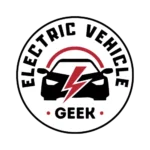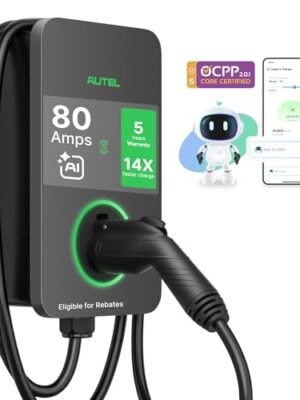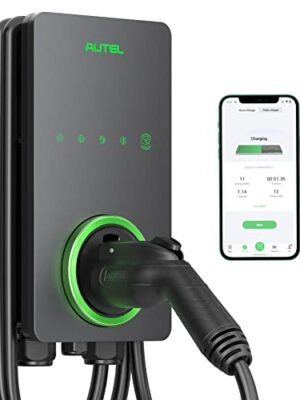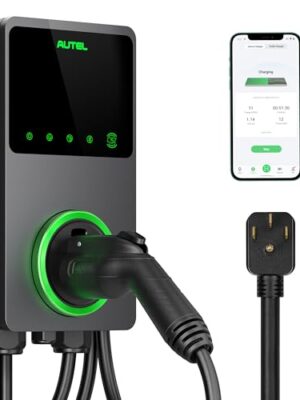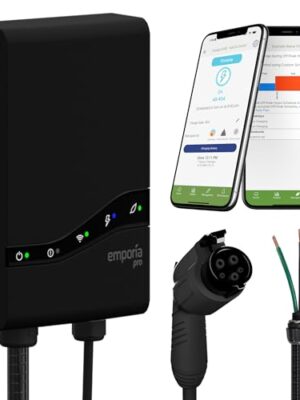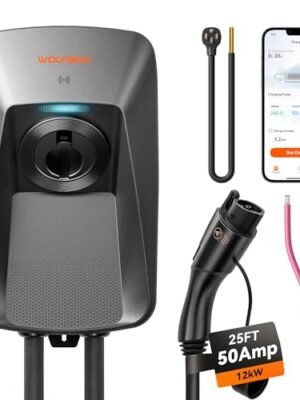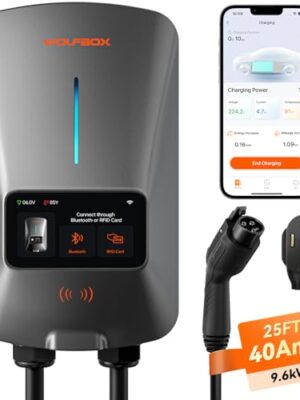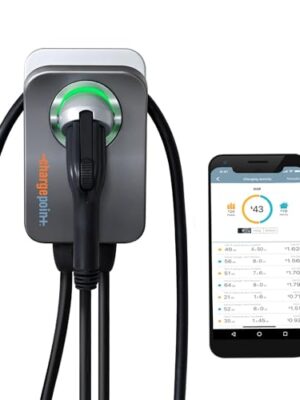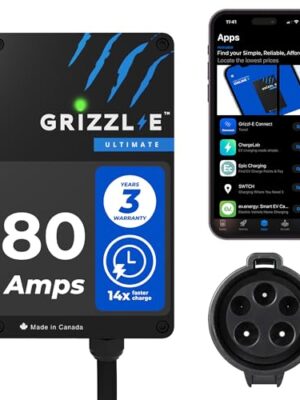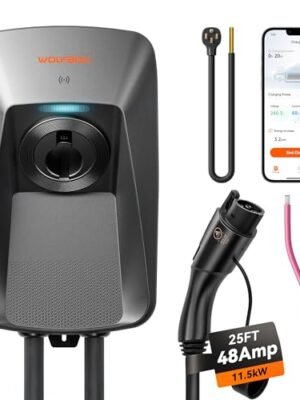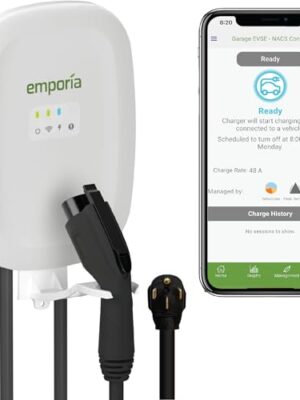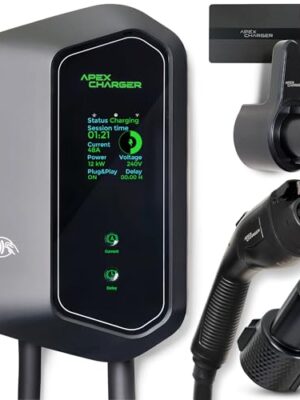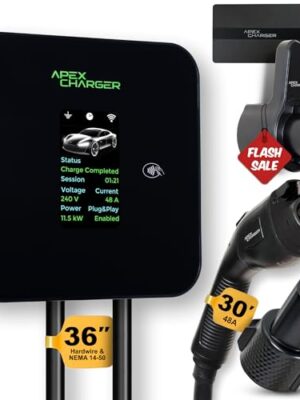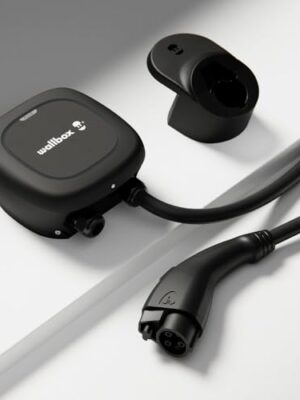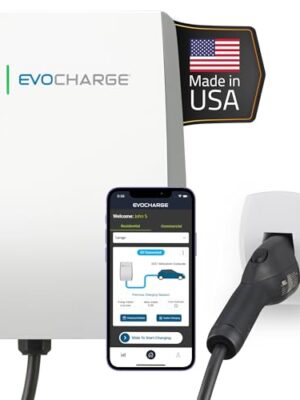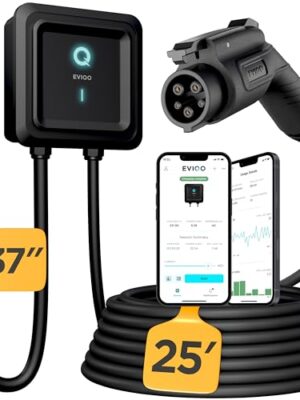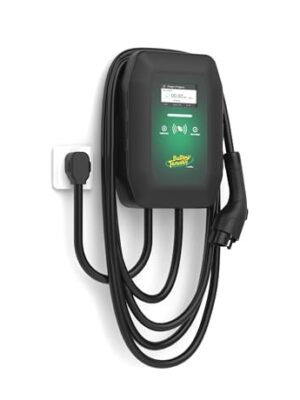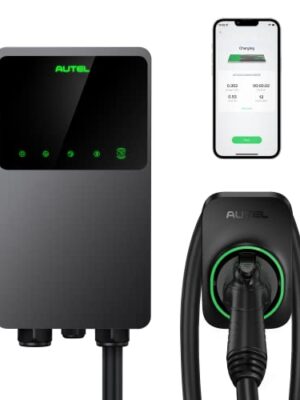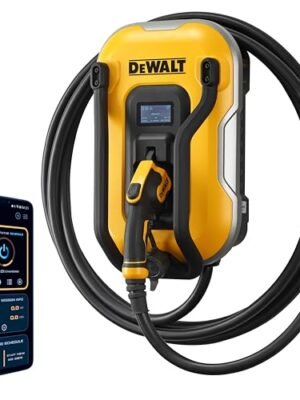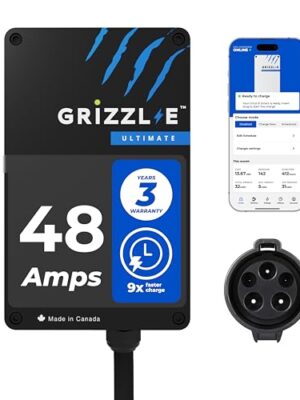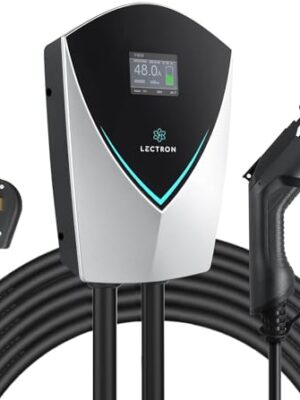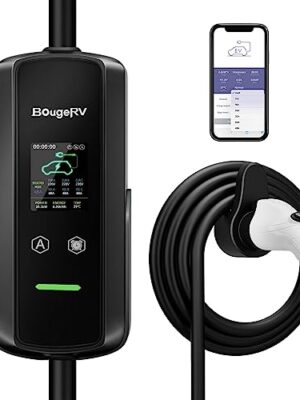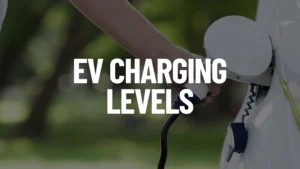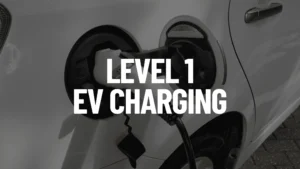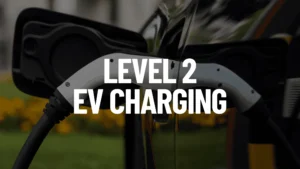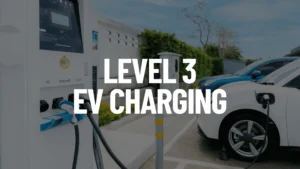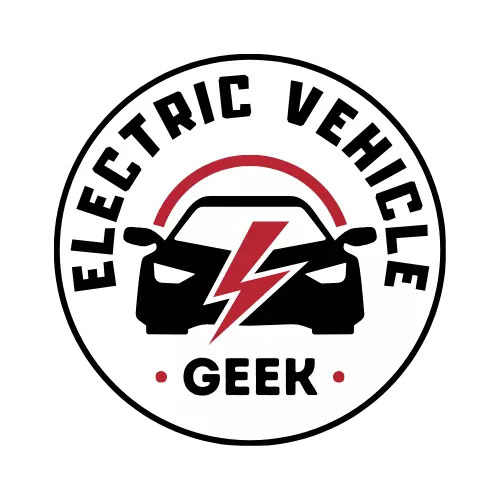Supported by you via insider access, and when you purchase through links on our site, we may earn an affiliate commission. See our Affiliate Disclosure.
BMW Charging Hub
Get trusted charger reviews, setup tips, and installation advice for charging fully electric or newer Plug-in Hybrid BMW EVs, including the i4, i5, i7, iX, and iX2.
Best BMW Home Charger
Discover the top BMW home EV charger upgrades and replacements we recommend for fully electric and newer Plug-in Hybrid models, including the i4, i5, i7, iX, and iX2 common BMW EV models in North America, these expert-tested chargers utilize a J1772 connector and deliver up to 11 kW AC (the maximum supported by your BMW’s onboard charger), providing a faster, safer, and more efficient home charging solution than the BMW flexible fast charger.
Use the “Compare” button on each product to select multiple chargers, then click the ⚖️ scale icon to see a full side-by-side comparison.
2025 BMW i4 (eDrive35, eDrive40, M50)
The 2025 BMW i4 is an all-electric Gran Coupe, available in various configurations. Battery sizes typically range from 67 kWh (usable for eDrive35) to 81.2 kWh (usable for eDrive40/M50). It features an 11 kW onboard AC charging module. WLTP-rated range varies from around 280 miles (450 km) to over 360 miles (580 km) depending on the variant and battery size, with efficiency around 155-180 Wh/km.
The BMW i4 uses a Type 2 charging port (Europe/global markets) or SAE J1772 charging port (North America) for AC Level 1 and Level 2 charging, and a CCS Combo 2 port (Europe/global markets) or CCS Combo 1 port (North America) for DC fast charging.
2025 BMW i4 Home Charging Options
BMW i4 supports AC Level 1 charging (230V, 10 amps in Europe; 120V in North America), providing approximately 10-13 km (6-8 miles) of electric range per hour. For faster home charging, it supports AC Level 2 charging (400V 3-phase, up to 16 amps in Europe delivering 11 kW; 240V in North America delivering up to 11 kW), providing approximately 45-60 km (28-37 miles) of range per hour, for a full charge in around 8 hours 45 minutes for the larger battery.
2025 BMW i4 Public Charging Options
For ultra-rapid charging, the i4 supports DC fast charging at up to 205 kW. This capability allows for a 10% to 80% charge in approximately 28-30 minutes, with the vehicle’s battery management system actively preconditioning the battery and modulating power delivery to maintain high charging speeds throughout the session.
2025 BMW i5 (eDrive40, M60 xDrive)
The 2025 BMW i5 is an all-electric sedan, including performance variants. It is equipped with an 81.2 kWh (usable) lithium-ion battery (84.4 kWh gross). Standard models typically feature an 11 kW onboard AC charging module, while some markets/trims (like the M60) may offer an optional 22 kW onboard AC charger. WLTP-rated range is up to around 360 miles (580 km) for the eDrive40, with efficiency around 169-192 Wh/km.
The BMW i5 uses a Type 2 charging port (Europe/global markets) or SAE J1772 charging port (North America) for AC Level 1 and Level 2 charging, and a CCS Combo 2 port (Europe/global markets) or CCS Combo 1 port (North America) for DC fast charging.
2025 BMW i5 Home Charging Options
BMW i5 supports AC Level 1 charging (230V, 10 amps in Europe; 120V in North America), providing approximately 11 km (7 miles) of electric range per hour. For faster home charging, it supports AC Level 2 charging (400V 3-phase, up to 16 amps in Europe delivering 11 kW; 240V in North America delivering up to 11 kW), providing approximately 55 km (34 miles) of range per hour, for a full charge in around 8 hours 45 minutes. With the optional 22 kW onboard charger, this time is halved to around 4 hours 30 minutes.
2025 BMW i5 Public Charging Options
For ultra-rapid charging, the i5 supports DC fast charging at up to 205-206 kW. This robust capability allows for a 10% to 80% charge in approximately 26-30 minutes, by leveraging intelligent thermal management and battery preconditioning to sustain high power output across the battery’s state of charge.
2025 BMW i7 (eDrive50, xDrive60, M70 xDrive)
The 2025 BMW i7 is an all-electric luxury sedan. It is typically equipped with a large 101.7 kWh (usable) or 105.7 kWh (usable) lithium-ion battery (111.5 kWh gross for M70) and an 11 kW onboard AC charging module. WLTP-rated range can exceed 370 miles (600 km) depending on the variant, with efficiency around 180-200 Wh/km.
The BMW i7 uses a Type 2 charging port (Europe/global markets) or SAE J1772 charging port (North America) for AC Level 1 and Level 2 charging, and a CCS Combo 2 port (Europe/global markets) or CCS Combo 1 port (North America) for DC fast charging.
2025 BMW i7 Home Charging Options
BMW i7 supports AC Level 1 charging (230V, 10 amps in Europe; 120V in North America), providing approximately 10-11 km (6-7 miles) of electric range per hour. For faster home charging, it supports AC Level 2 charging (400V 3-phase, up to 16 amps in Europe delivering 11 kW; 240V in North America delivering up to 11 kW), providing approximately 45-50 km (28-31 miles) of range per hour, for a full charge in around 10 hours 15 minutes to 11 hours 15 minutes depending on the specific battery. Some markets may offer a 22 kW onboard charger as an option, which would reduce the AC charging time significantly.
2025 BMW i7 Public Charging Options
For ultra-rapid charging, the i7 supports DC fast charging at up to 195 kW (for xDrive60) to 200 kW (for M70). This capability allows for a 10% to 80% charge in approximately 30-34 minutes, utilizing a sophisticated battery management system to handle high power inputs, perform battery preconditioning, and maintain efficient charging across various conditions.
2025 BMW iX (xDrive50, M60)
The 2025 BMW iX is an all-electric SUV, available in powerful configurations. It is equipped with large batteries: 105.2 kWh (usable) for the xDrive50 and 111.5 kWh (usable) for the M60. It features an 11 kW onboard AC charging module (with an optional 22 kW onboard charger available in some markets). WLTP-rated range typically falls between 350-400 miles (560-640 km), with efficiency around 180-200 Wh/km.
The BMW iX uses a Type 2 charging port (Europe/global markets) or SAE J1772 charging port (North America) for AC Level 1 and Level 2 charging, and a CCS Combo 2 port (Europe/global markets) or CCS Combo 1 port (North America) for DC fast charging.
2025 BMW iX Home Charging Options
BMW iX supports AC Level 1 charging (230V, 10 amps in Europe; 120V in North America), providing approximately 9-10 km (5-6 miles) of electric range per hour. For faster home charging, it supports AC Level 2 charging (400V 3-phase, up to 16 amps in Europe delivering 11 kW; 240V in North America delivering up to 11 kW), providing approximately 40-45 km (25-28 miles) of range per hour, for a full charge in around 10 hours 10 minutes to 11 hours 15 minutes. An optional 22 kW onboard charger can halve this time.
2025 BMW iX Public Charging Options
For ultra-rapid charging, the iX supports DC fast charging at up to 195 kW (for xDrive50) to 200 kW (for M60). This allows for a 10% to 80% charge in approximately 35-39 minutes, dynamically adjusting the charging power based on battery temperature, state of charge, and charger capabilities for optimized speed and battery longevity.
2025 BMW iX2 (eDrive20, xDrive30)
The 2025 BMW iX2 is an all-electric compact SUV/coupe. It is equipped with a 64.8 kWh (usable) lithium-ion battery (66.5 kWh gross) and an 11 kW onboard AC charging module (with an optional 22 kW onboard charger). WLTP-rated range is around 250-270 miles (400-435 km), with efficiency around 16.1-17.7 kWh/100km.
The BMW iX2 uses a Type 2 charging port (Europe/global markets) or SAE J1772 charging port (North America) for AC Level 1 and Level 2 charging, and a CCS Combo 2 port (Europe/global markets) or CCS Combo 1 port (North America) for DC fast charging.
2025 BMW iX2 Home Charging Options
BMW iX2 supports AC Level 1 charging (230V, 10 amps in Europe; 120V in North America), providing approximately 13 km (8 miles) of electric range per hour. For faster home charging, it supports AC Level 2 charging (400V 3-phase, up to 16 amps in Europe delivering 11 kW; 240V in North America delivering up to 11 kW), providing approximately 49-55 km (30-34 miles) of range per hour, for a full charge in around 6 hours 30 minutes. An optional 22 kW onboard charger can significantly reduce this to about 3 hours 45 minutes.
2025 BMW iX2 Public Charging Options
For rapid charging, the iX2 supports DC fast charging at up to 130 kW. This capability allows for a 10% to 80% charge in approximately 29 minutes, with the vehicle’s charging system managing the power intake to ensure efficient and safe charging of the 400V battery architecture.
Choose the right charging option for your BMW EV. Here’s a quick guide to Level 1, Level 2, and Level 3 (DC Fast) charging for BMW electric vehicle models like the i4, i5, i7, iX, and iX2.
Plugs into standard household outlets; ideal for very slow overnight top-ups.
Faster home/public charging via wallbox; fully charges overnight or in a few hours.
Ultra-rapid public charging; adds significant range in under 30-40 minutes.
BMW Charging Hub
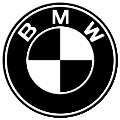
BMW is a German luxury automaker founded in 1916 and headquartered in Munich, Bavaria. Known for producing vehicles that combine driving pleasure with premium quality, BMW has become one of the most recognized automotive brands in the world. Electrification is now a core pillar of BMW’s strategy, with the brand investing heavily in its electric ‘i’ sub-brand.
BMW’s electric vehicle lineup includes some of the most capable and stylish EVs on the market. The BMW i4 is a sporty electric sedan available in rear-wheel and all-wheel drive configurations. The BMW i5 brings electric power to the beloved 5 Series, while the i7 offers a fully electric version of BMW’s flagship luxury sedan.
The BMW iX is the brand’s electric flagship SUV, featuring a spacious interior, advanced technology, and impressive range. The iX2 is a more compact electric crossover aimed at younger buyers who want BMW’s electric performance in a smaller package. BMW also offers PHEV versions of popular models like the X5, 3 Series, and 5 Series.
BMW EVs support AC charging at home via a standard J1772 connector. Many BMW electric vehicles can accept up to 11 kW of AC charging, so a 48-amp Level 2 home charger delivers the fastest possible home charging speed. The BMW Charging app makes it easy to schedule sessions and monitor charging remotely.
BMW also offers its own home charging solution, the BMW Wallbox, but their vehicles are fully compatible with third-party Level 2 chargers. This gives BMW EV owners a wide range of charger options at different price points.
Whether you drive an i4, i5, i7, iX, or iX2, our BMW charging hub provides compatible BMW EV charger reviews, setup tips, and accessory recommendations you need to charge your BMW EV smarter at home.

James Ndungu is a certified EV charger installer with over five years of experience in EVSE selection, permitting, and installation. He holds advanced credentials, including certification from the Electric Vehicle Infrastructure Training Program (EVITP) and specialized training in EV charging equipment and installation, as well as diplomas in EV Technology and Engineering Fundamentals of EVs. Since 2021, James has tested dozens of EV chargers and accessories, sharing expert insights into the latest EV charging technologies.
